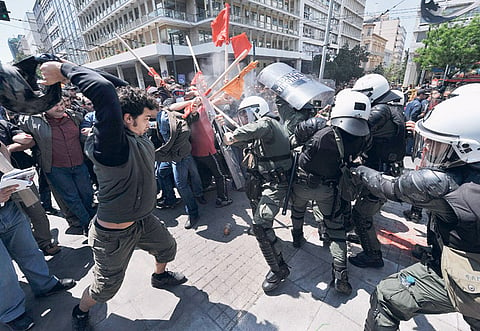Merkel warns Greece on bailout
German chancellor says she's more concerned about stability of the euro

Soest, Germany: German Chancellor Angela Merkel hit the campaign trail with a warning to Greece and the rest of the euro region that a bailout of the debt-stricken nation isn't a done deal.
"I've said for weeks that Greece must do its homework first," Merkel said late on Monday, drawing applause from an audience in the town of Soest in North Rhine-Westphalia, where state elections are due on May 9. She said that while Germany is prepared to release funds for debt-stricken Greece, "first I want to see the programme."
Greece is paying the price for Merkel's bid to keep her coalition in control of Germany's biggest state and ease voters' anger about having to help fund a $60 billion (Dh220.68 billion) bailout.
Greek bonds plunged on Monday as Germany's reluctance to guarantee funds stoked concern that a rescue package co-financed by the euro region and the International Monetary Fund could still fall apart.
Greece has 8.5 billion euros (Dh41.6 billion, $11.3 billion) of bonds coming due 10 days after the regional election and the extra yield that investors demand to hold its 10-year bonds over German bunds jumped 93 basis points to 652 basis points on Monday.
"It is extraordinary that a euro zone member country finds itself a mere three weeks away from a potential default with a clear possibility that uncertainty will only be resolved at the last minute," said Marco Annunziata, chief European economist at UniCredit Group in London.
Aims
Merkel dwelt on Greece at Monday's rally as her Christian Democrats defend their hold on the state, saying any rescue would have the aim of supporting the euro rather than bailing out a Greek state that lived beyond its means.
"We're not doing this because we believe Greece needs help," she said. "We're doing it because we're interested in the euro's stability. We can't idly stand by when our currency comes under threat."
The euro has dropped 7 per cent against the dollar this year and fell 0.4 per cent to $1.3331 at 1:10pm in New York on Monday.
In Greece, Prime Minister George Papandreou was due yesterday to brief lawmakers on the economic outlook. Transport workers held a strike and the ADEDY civil service union staged a rally, Greece's biggest private-sector union, will also decide on whether to go on strike.
Majority at risk
Polls in recent weeks show Merkel's Christian Democrats and their Free Democratic allies at risk of losing their governing majority in North Rhine-Westphalia, Germany's most populous state. The two parties, which also underpin Merkel's national government, fell short of a majority with support of 46 per cent in an April 21 Forsa poll for Stern magazine.
The margin of error was plus or minus 3 percentage points.
A defeat for Merkel might wipe out her coalition's majority in the upper house of the national parliament and hamper her government's efforts to cut taxes and extend the life of German nuclear power plants.
Merkel told the rally she wants Greece to agree to several years of budget cuts before releasing any German aid.
"Greece has put savings measures into effect this year, but one year won't be enough" to restore confidence in the financial markets, she said.
Greek Finance Minister George Papaconstantinou was negotiating terms of the aid during a meeting of counterparts from the world's biggest nations in Washington.
With Greece facing 8.5 billion euros of bonds maturing May 19, finance ministers yesterday sought a swift resolution of the talks amid concern any delay may trigger a further sell-off and spread to other markets.
European Central Bank President Jean-Claude Trichet said he's certain aid talks for Greece won't drag on.
"I'm confident that the negotiations" regarding the aid package "will conclude soon," Trichet said at an event in New York on Monday.
The German government will seek "fast-track" parliamentary approval for Greek aid that may begin next week once the International Monetary Fund (IMF) has finished its review, German Finance Minister Wolfgang Schaeuble said after briefing lawmakers in Berlin yesterday.
"First I want to see the programme the IMF and Greece and the European Commission have worked out," Merkel told the campaign rally. "Then we'll talk about what we have to do."
Sign up for the Daily Briefing
Get the latest news and updates straight to your inbox


